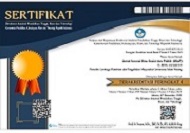Election in the digital period: a literature review
DOI:
https://doi.org/10.33474/jisop.v4i2.18249Keywords:
Elections, E-Voting, I-Voting, DRE System, Public TrustAbstract
The discourses to hold electronic elections or E-Voting also emerged in Indonesia. Several public figures stated that Indonesia needed to hold electronic elections. Before deciding to implement E-Voting, it is necessary to consider various aspects to maintain election principles. This article reviewed the implementation of elections in India, Estonia, Canada, and Brazil that have implemented E-Voting. The research method in this research was a literature review. The analysis results showed that India and Brazil used an E-Voting system with a machine or a DRE system. Estonia and Canada used the internet or I-Voting system. Public trust needed to be considered based on the four countries implementing E-Voting. Network stability, access to digital voters, and ease of access were obstacles that Estonia and Canada faced in implementing the I-Voting system. Voter participation, engine performance, and power grids were obstacles that India and Brazil faced in implementing the DRE system. Based on experiences from India, Brazil, Estonia, and Canada, Indonesia must design specific strategies to minimize the risk of implementing E-Voting in elections. Therefore, the advice that can be given is that the implementation of E-Voting can be started in stages and accompanied by efforts to equalize digital infrastructure in various regions and digital education in the community.References
A., A. (2016). Internet Voting System and Digital India. International Journal of Emerging Trends & Technology in Computer Science (IJETTCS), 5(1), 62–64. https://ssrn.com/abstract=2775315
Ardipandanto, A. (2019). Permasalahan Penyelenggaraan Pemilu Serentak Tahun 2019. Info Singkat Pusat Penelitian Dan Keahlian DPR RI, XI(11), 25–30.
Avgerou, C. (2013). Explaining Trust in IT-Mediated Elections: A Case Study of E-Voting in Brazil. Journal of the Association for Information Systems, 14(8), 420–451. https://doi.org/10.17705/1jais.00340
Bachmid, F., & Djanggaih, H. (2022). The Future of E-voting Implementation in Indonesian General Election Process: Constitutionality, Benefits and Challenges. Varia Justica, 18(1), 34–51. https://doi.org/https://doi.org/10.31603/variajusticia.v18i1.6359
Dahl, R. A. (1985). Dilema Demokrasi Pluralis: Antara Otonomi dan Kontrol. Rajawali Pers.
Ehin, P., Solvak, M., Willemson, J., & Vinkel, P. (2022). Internet voting in Estonia 2005–2019: Evidence from eleven elections. Government Information Quarterly, 39(4), 1–14. https://doi.org/10.1016/j.giq.2022.101718
Garnett, H. A., & James, T. S. (2020). Cyber Elections in the Digital Age: Threats and Opportunities of Technology for Electoral Integrity. Election Law Journal: Rules, Politics, and Policy, 19(2), 111–126. https://doi.org/10.1089/elj.2020.0633
Goodman, N. J. (2014). Internet Voting in a Local Election in Canada. In B. Grofman, A. H. Trechsel, & M. Franklin (Eds.), The Internet and Democracy in Global Perspective (pp. 7–24). Springer Nature. https://doi.org/10.1007/978-3-319-04352-4_2
Gushardana, R. R., Sripokangkul, S., Kamil, M., & Sulistyaningsih, T. (2020). The Presence of Electronic Democracy (E-Democracy) as a Democratization of The Philippines Government in Obtaining a People’s Vote. Journal of Local Governance and Innovation, 4(1). https://so03.tci-thaijo.org/index.php/JLGISRRU/article/view/239408
Habibi, M., & Nurmandi, A. (2018). Dinamika Implementasi E-Voting di Berbagai Negara. Center for Open Science, 1(1). https://doi.org/10.31219/osf.io/bu2ax
Hapsara, M., Imran, A., & Turner, T. (2017). Beyond Organizational Motives of e-Government Adoption: The Case of e-Voting Initiative in Indonesian Villages. Procedia Computer Science, 124, 362–369. https://doi.org/10.1016/j.procs.2017.12.166
Husna, H. T. (2022). Usulan Penerapan e-Voting dalam Pemilu 2024 Perlu Kajian Komprehensif. Kominfo.
IDEA. (2011). Introducing Electronic Voting: Essential Considerations.
International Institute For Democracy And Electoral Assistance. (2001). International Electoral Standards (Guidelines for reviewing the legal framework of elections). International IDEA.
Kersting, N., & Baldersheim, H. (Eds.). (2004). Electronic Voting and Democracy: A Comparative Analysis. Palgrave Macmillan UK. https://doi.org/10.1057/9780230523531
Liphart, & Arend. (1984). Democracies, Patterns of Majoritarian and Consensus Government in Twenty-One Countries (Yale Unive).
Mahpudin. (2019). Teknologi Pemilu, Trust, dan Post Truth Politics: Polemik Pemanfaatan SITUNG (Sistem Informasi Penghitungan Suara) Pada Pilpres 2019. JurnalPolgov, 1(1), 157–195. https://doi.org/10.22146/polgov.v1i2.55886
OSCE, & ODIHR. (2007). OSCE/ODIHR election assessment mission report on parliamentary elections 4 March 2007.
Putri, P. E. (2018). Banyak Data Ganda, Bawaslu Rekomendasi Rekapitulasi DPT Nasional Ditunda. Bawaslu, https://bawaslu.go.id/id/berita/banyak-data-ganda-. https://bawaslu.go.id/id/berita/banyak-data-ganda-bawaslu-rekomendasi-rekapitulasi-dpt-nasional-ditunda
Reddy, A. K. (2011). A Case Study on Indian E.V.M.S Using Biometrics. International Journal of Engineering Science & Advanced Technology, 1(1), 40–42.
Rokhman, A. (2011). Prospek dan Tantangan Penerapan E-Voting dan Indonesia. Seminar Nasional Peran Negara Dan Masyarakat Dalam Pembangunan Demokrasi Dan Masyarakat Madani Di Indonesia.
Rowley, J., & Slack, F. (2004). Conducting a literature review. Management Research News, 27(6), 31–39. https://doi.org/10.1108/01409170410784185
Setyaningrum, P. (2022). Sejarah Pemilu di Indonesia dari Tahun 1955 hingga 2019. Kompas.
Sugiyono. (2015). Metode Penelitian Kuantitatif, Kualitatif dan Kombinasi (1st ed.). Alfabeta.
Suny, I. (1978). Mekanisme Demokrasi Pancasila. Aksara Baru.
Suri, E. W., & Yuneva. (2021). Akselerasi Transformasi Digital Pada Tata Kelola Pemilu di Kota Bengkulu. Mimbar: Jurnal Penelitian Sosial Dan Politik, 10(2), 172–181. https://doi.org/10.32663/jpsp.v10i2.2257
Webb, P. D., Eulau, H., & Gibbins, R. (n.d.). Election. Encyclopedia Britannica.
Wolchok, S., Wustrow, E., Halderman, J. A., Prasad, H. K., Kankipati, A., Sakhamuri, S. K., Yagati, V., & Gonggrijp, R. (2010). Security analysis of India’s electronic voting machines. Proceedings of the 17th ACM Conference on Computer and Communications Security - CCS ’10, 1. https://doi.org/10.1145/1866307.1866309
Downloads
Published
How to Cite
Issue
Section
License
Copyright (c) 2022 Syam Rahmanto

This work is licensed under a Creative Commons Attribution-ShareAlike 4.0 International License.
.


_-_Copy.jpg)





